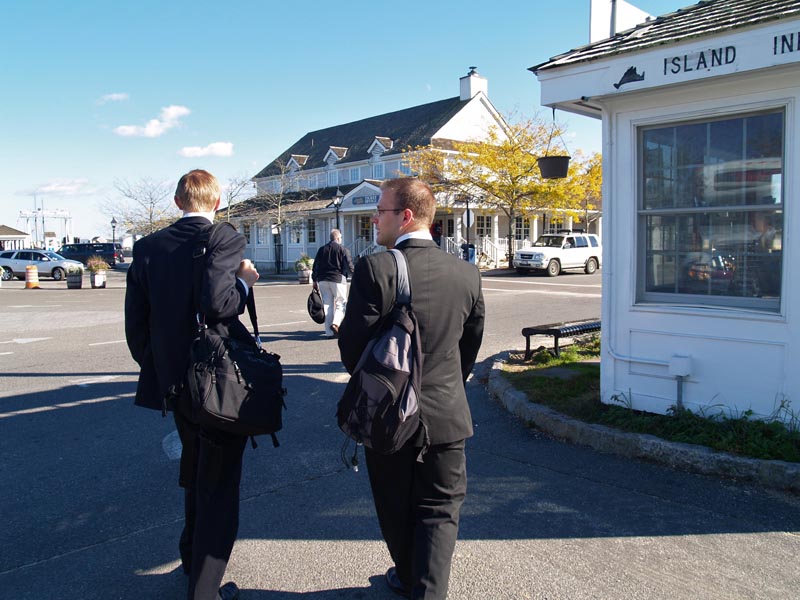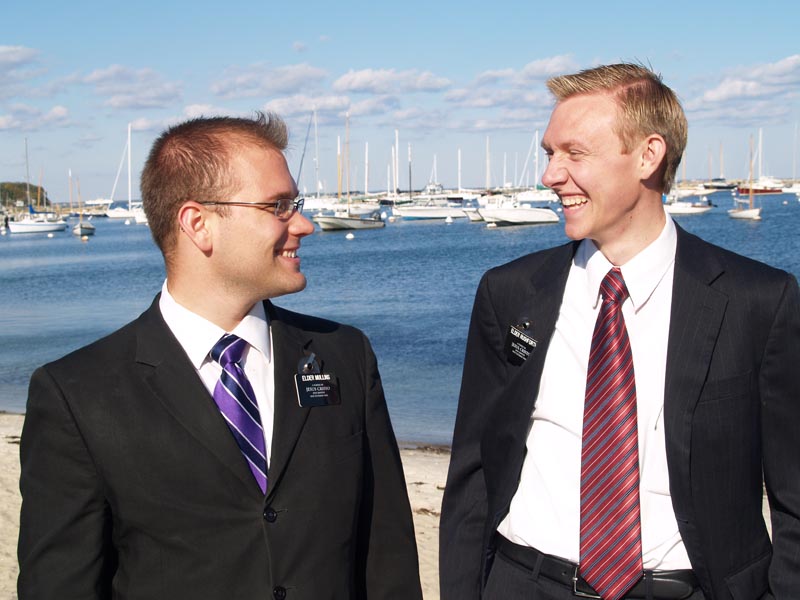On a recent Sunday morning, in a small office space near the Black Dog Bakery Cafe, Elder Aric Mullins and Elder Garret Rushforth sat with other members of the Church of Jesus Christ of the Latter-day Saints and listened to a sermon about temptation and making the right choices. Nearly a year ago, Elders Mullins (20) and Rushforth (19) left the stability and security of their homes in Indiana and Utah, respectively, to embark on a two-year mission. They each boarded a plane, the first time on a commercial jet for Elder Rushforth, and headed to the missionary training center in Provo, Utah, where they spent nine weeks learning how to teach non-members about the Mormon religion. In addition, they learned how to speak Portuguese, in an effort to reach the Brazilian and Cape Verdian communities.
Before arriving on the Island at the end of August, Elder Mullins served in Brockton and Framingham, and Elder Rushforth served in Central Falls, R.I. and Cambridge. Their mission experience has been somewhat different than it would be serving in areas where communities are more familiar with the Mormon culture.
“New England is its own culture,” Elder Mullins said. “It’s totally different. Out here we’ll offer to help someone just with their groceries and they say, ‘No I’m all set’ and we might not even be dressed like this, it might be our day off, so we’re in normal clothes. They don’t know we’re missionaries but they don’t want help. It’s just part of the culture.”
The small meeting space is a striking departure from the large LDS churches found elsewhere. The church does own land off of the Edgartown-Vineyard Haven Road, but has held off building a permanent space until its membership numbers grow. Currently, the Martha’s Vineyard branch of the LDS church has 60 registered members across the Island, with about 20 to 25 active members.
Missions operate in transfer cycles, so after their initial placement, missionaries find out every six weeks where they will be headed next. Their placement is determined by a mission president who, through the process of “continuing revelation,” prays to find out where they should be assigned. Sometimes they remain in the same community, other times they move around. And they rarely stay with the same partner.
“It’s interesting because within a mission there’s always almost a separate culture because we choose to cut ourselves off from everything, so it devolves into its own culture,” Elder Mullins said. “Not knowing where we might end up creates a kind of fun guessing game amongst all the missionaries.”
Missions are designed to give the young members independence, to strengthen their faith, to serve communities with “Christ-like service” and also to give members a sense of purpose — especially for those just graduating from high school with no concrete plans for the future.
“There’s an age range where young men make the biggest decisions of their lives, or the biggest mistakes, and that’s the ages between 19 and 21,” Elder Rushforth said. “As a missionary I don’t have that temptation to get involved in things that could really mess up my life. I just don’t see those things as being things I want to be a part of because of my growth from being a missionary.”
Missions are not easy, though. Aside from being placed in an unfamiliar community, the schedule is rigid. Missionaries wake up at 6:30 a.m., are required to exercise, study for three hours (one hour in Portuguese) and then head out into the community. They must be in bed by 10:30 p.m. Once a week, they spend a day doing laundry, errands, setting their schedule and e-mailing their families. Other than this weekly e-mail correspondence, missionaries can only contact their family via telephone twice a year: on Mother’s Day and on Christmas Day.
“It was a little hard at first just because I hadn’t had that situation where I’ve been away from my family,” Elder Rushforth said. “As I’ve grown up and gotten into what it means to be a missionary and what the purpose of this is, the homesickness has melted away. I miss my family and I love my family and I look forward to the time I go back, but that’s not why I’m here now.”
“For me it’s a little bit different,” Elder Mullins said. “I didn’t have that feeling of homesicknesses at the beginning . . . once I got away it was almost refreshing because I had to do things more on my own without that dependence on my brothers and sisters or my parents. It’s really helped me to grow up out of that spoiled oldest child to sort of being a man of my own and it’s really helped me to grow.”
Because of the rural nature of the Island landscape and the seasonal population, traditional mission style door-knocking isn’t an easy practice. Without access to a car, the young men spend much of their time riding the VTA bus. As a result the bus has become a site to have conversations and share their message. They both admitted this was difficult at first.
“It is hard to go up to a complete stranger and strike up a conversation,” Elder Mullins said. “And then to have to share one of the most intimate parts about us. The two things you don’t ever talk about is religion and politics because its so personal.”
For Elder Rushforth, who grew up in Utah, being in New England has made him more aware of the stigma against Mormons.
“Being a member of the Church of Jesus Christ of Latter-day Saints, being a missionary for it, it really classifies me as a minority,” he said. “I never considered myself a minority before. I grew up in Utah and it wasn’t something that was on my mind. And our minority seems to be one of the minorities where it’s an acceptable prejudice. It seems that people can say something against the Mormon church and laugh and continue with their conversation. If that was another minority it would be, ‘My goodness, you can’t do that, that’s unacceptable.’ ”
“It’s almost part of human nature to make an instant judgement call and it to be a negative one because oftentimes people just don’t know,” Elder Mullins added. “That’s ultimately where any degree of prejudice comes from, it’s just a lack of knowing.”
One of the biggest misconceptions is the practice of polygamy. While it was legal at one time for Mormons to have multiple wives, the law was turned over in 1890 and the church disavowed the practice. Some Mormon fundamentalists still practice polygamy, adding to the misconception that all Mormons condone polygamy, but those sects are very small and are not recognized by the LDS church.
“Part of being missionaries is to disperse those clouds, if you will, because it prevents people from knowing who we really are,” Elder Mullins said.
“I’ve had the experience of people responding negatively and lashing out, not violently but in a manner that’s degrading,” Elder Rushforth said. “It hurts me a little bit because they don’t understand, and they’re not willing to understand, and it’s stressful because I know what I have is good for them and I want to share it with them.”
And how can he be sure that sharing the Mormon religion is good for everyone?
“We don’t ask people to just believe us,” Elder Rushforth said. “We ask people to experiment. Knowledge comes through experience. My knowledge, I can honestly say, did not come until I made the experiment myself. We can throw facts all day, but that doesn’t bring conversion. It’s a feeling, it’s a testimony within yourself and God has answered your prayers. I know he’s answered my prayers; that’s why I’m here.”
In response to Hurricane Sandy, Elders Mullin and Rushforth (along with fellow missionaries currently serving in New England) will be mobilized to Connecticut in mid-November to assist with relief and clean up efforts.







Comments (15)
Comments
Comment policy »